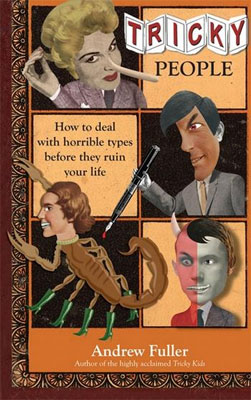Tricky People Interview

Tricky People
How to deal with horrible types before they ruin your life.
Is someone out there trying to ruin your life?
Do you have someone in your life whose one aim seems to be to make everything hard, unpleasant or downright rotten for you? Maybe it's someone you work with, live with or share a family with, but we all know at least one tricky person.
Taking the lead from Jean-Paul Sartre who wrote that 'hell is other people', psychologist Andrew Fuller presents a complete survival guide to difficult people in his latest book, Tricky People.
Based on over 25 years working with people, many of whom were struggling with a difficult person, Tricky People explores the challenging dynamics of being in a relationship with someone who makes your life hell!
They come in a variety of forms. There's the Backstabber, the Blamer, and the Whinger; the Bullies and the Tyrants; the Controllers; the High and Mighties; the Avoiders; the Competitors' and the Poor Communicators, and in their own unique ways they can cause everything from mild irritation to lasting emotional damage.
But there are many ways to hang onto your sanity and put these tricky people in their place.
Knowing how to deal with tricky people is an important life skill. Unfortunately accommodating, acclimatising to, avoiding or acquiescing to tricky people never works. Taking them on in an upfront fi ght, running away or just freezing and seething wont work either.
Its important to recognise the key traits of tricky people so you are familiar with their tactics, but also learn how you respond to them and which of your sensitive buttons they push.
My aim is to help people understand these diffi cult souls, deal with the intricacies of offi ce politics, and the intrigues of family dramas, and rise above the hotbed of rumour and innuendo! And also recognise and overcome their own trickiness.
How to pick 'em- a diagnostic checklist for tricky types:
Back-stabbers: brag and boast, are happy to spread negative news about others, spread gossip, claim credit for things they didn't do, are selective about who they praise or talk to, often conceal feelings of inadequacy and fearfulness.
Famous examples: Brutus, Lady Macbeth.
Blamers and Whingers: complain about others, point the finger, are guilt-traders, can give it but can't take it, know how to hold a grudge, conceal a fear of being responsible.
Famous examples: Lady Bracknell, Catherine of Aragon.
Bullies and Tyrants: are abusive, demanding, insulting, threatening, belittling, make unnecessary personal attacks and try to gain power at your expense.
Famous examples: Pol Pot, Winston Churchill.
Controllers: don't like surprises, are unable to see things from anyone's perspective but their own, view suggestions and input as threats to be squashed, control the flow of information and conceal feelings of insecurity and anxiety.
Famous examples: Margaret Thatcher, Mao Zedong.
High and Mighties: are smarmy but can be charming, are lone rangers who do not work well with others, gather supporters, acolytes and disciples, and fear they won't measure up.
Famous examples: Noel Coward, Oscar Wilde.
Avoiders: don't show up when the heat is turned up, are slippery and their actions don't match their word. They promise the world then don't deliver and continually disappoint you, may be a great borrower but a poor returner, and may mask a fear of not being capable or a fear or being successful.
Famous examples: Casanova, Ronald Biggs.
Competitors: will argue tooth and nail, invest a lot of time in frivolous battles, are unscrupulous and gleeful in victory, are not team player and have difficultly with collaboration, find it hard when others succeed, may 'find' crises when you are away to show that you are enept, and are fearful of not being the best.
Famous examples: Julius Caesar, Napoleon.
Poor Communicators: are irrational and erratic, have foot-in-mouth disease, erupt without a moment's notice, are unpredictable, moody and confrontational, and feel anxious about not being able to contain feelings.
Famous examples: George W. Bush, Ronald Reagan.
Andrew Fuller a clinical psychologist, family therapist and author of the highly acclaimed Tricky Kids has encountered thousands of tricky people and, thankfully, survived to pass on what he knows. He lives with his family outside Melbourne.
Tricky People
Finch
Author: Andrew Fuller
ISBN: 9781921462023
Price: $24.95
Andrew Fuller talks on Tricky People
What drew you to write this book?
Andrew Fuller: Having written Tricky Kids people kept coming up to me saying things like, " I used to be married to one of them", " My in-laws are just like that" or "I work with one of them". This lead to me ask thousands of people in workshops to describe the difficult people in their lives. Their descriptions became the basis for the types described in the book.
It was concerning to learn that very few people had an experience of fixing their relationships with tricky people.
Do you suggest that you diagnose which category the 'tricky' people in your life belong in?
Andrew Fuller: Knowledge is power. By gaining an understanding of the preferred modis operandi of the tricky people in your life you are more able to create strategies for improving your relationships with them.
Is it worthwhile trying not to socialize with these 'tricky' people?
Andrew Fuller: While many tricky people come under the category of " people who it is best to avoid" it is harder to do than it seems. In fact many people who left jobs, friendships or marriages because of a tricky person often find that another tricky person takes their place. Therefore learning to cope with them seems inevitable.
How can you deal with certain 'tricky' people, such as those you work with?
Andrew Fuller:
In Tricky People, we develop a chillpill for coping with different types. This includes:
C onduct cost- benefit analyses- decide whether to act or not to act
H ave a look for your patterns of relating to tricky people
I nsight into your own behaviour and role
L ook for the best outcomes
L ook for and select strategies
P erspective shifting skills
I mplement change strategies with tricky people
L essen the toxicity
L earn lessons for your future
Does everyone have at least a small part of them that is 'tricky'? Andrew Fuller: I think it is true that all of us are probably tricky for someone. I am sure I am for many!
Will readers find that they probably fit into a 'tricky' category?
Andrew Fuller: Readers will probably laugh and gasp as they recognise one of their own common tricky behaviours. The reason is that we all have insecurities and anxieties ad we all try to cover them up in usually tricky ways.
As I mention in the book, it is often when we are on our highest moral ground and are absolutely sure how right we are, is the very moment when we should smell a rat and look carefully to see if we are acting in tricky ways. The advantage of acting in tricky ways is that they work. The big disadvantage is that they cost us big time in terms of loss of intimacy in friendships, work places and in families.
By lifting the lid on our own tricky behaviours, we are more able to improve our relationships and our happiness.
What is next for you in the 'tricky' series?
Andrew Fuller: I think tricky moments in love is something we can probably all relate too!
MORE



